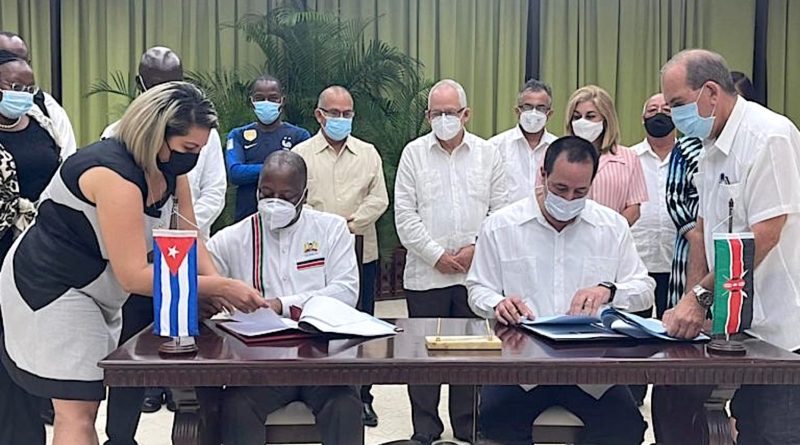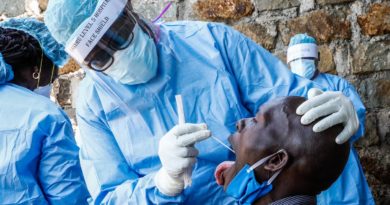Kenya Signs New Health Cooperation Agreement with Cuba
From health.go.ke
Health Cabinet Secretary, Hon. Mutahi Kagwe on Monday signed a new cooperation agreement with Cuban Minister of Public Health Dr. Jose Angel Portal Miranda that will see a brigade of 101 specialist Cuban doctors travel to Kenya as part of a medical exchange programme between the two countries.
The agreement was signed during a meeting that makes part of the CS’s three-week visit to Cuba on a mission seeking to improve Kenya’s primary healthcare. The visit will also see the CS pick lessons from Cuba on the country’s world class primary health care delivery model, and its highly successful programme to combat malaria.
Speaking in Havana, Cuba, the two counterparts appreciated the good working relationship between the two countries since 2001, especially in the Health Sector. CS Kagwe lauded the Government of Cuba for its efforts in supporting Kenya’s Health Sector through the Brigades and exchange programmes. He added that the contribution of Cuban doctors has been evident during the current Covid-19 pandemic where they have been a critical pillar in the fight against the contagion even as he outlined other areas of collaboration.
“There are many opportunities in Cuba that remain untapped, especially in the area of pharmaceutical, biotechnology, and vaccines. We look forward to a more robust collaboration,” said the CS.
CS Kagwe also stressed that the government of Kenya takes the security of Cuban doctors seriously, saying President Uhuru Kenyatta remains committed to the safe return of doctors Assel Herrera and Landy Rodriguez who were abducted by suspected al shabaab militants two years ago.
The Cuban visit comes at a time when the government is looking to improve and strengthen Kenya’s primary healthcare system as a catalyst to achieving universal healthcare. The Ministry of Health has been working towards the provision of affordable health care to all by strengthening health systems particularly public health facilities. At the core of these efforts is to refocus Kenya’s healthcare from the curative to preventive approach where financial and human resources are directed at primary health care.
In March 2018, as part of this mission, the government began implementing a health agreement signed with Cuba in 2017, an exchange programme which involved bringing into the country several Cuban doctors to help fill gaps in County hospitals. Just recently, 90 Kenyan doctors arrived back into the country from Cuba after receiving specialised training as part of the exchange programme. These doctors are being absorbed into county hospitals to help boost health delivery capacity at that level.
Additional Cuban health professionals have arrived in the country to help in mapping out key mosquito breeding sites across the country as part of measures to control the disease. This will be implemented through a two-year project on the use of biological methods for the control of mosquito vectors.
For the first time, the country is initiating a programme to end Malaria. A target of Ksh. 24 billion has been set towards this objective. Kenya is one of four countries where clinical trials of a Malaria vaccine have been going on. As a result, significant reductions in infections and deaths have been achieved in several Malaria-endemic regions. The country is on course to manufacture its own insecticide treated nets and anti-Malarial drugs.
The visit to Cuba by the CS therefore aims to consolidate knowledge, expertise, and actions that are already underway to achieve an effective primary health system in Kenya. The country stands to learn from Cuba’s effective primary health care model which has been tried and tested for many years. Kenya now looks to shift its approach and focus more on preventive as opposed to curative approaches, which is currently how the country’s health sector is oriented.




